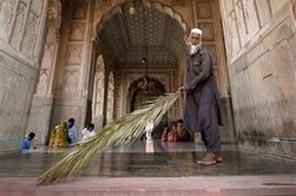Pakistani Taliban choose new leader
ISLAMABAD: Leading Pakistani Taliban commander Hakimullah Mehsud has been appointed the new head of the militant group, media reports said Saturday, weeks after Washington and Islamabad said the militants' chief, Baitullah Mehsud, was almost certainly killed by a missile strike.
Maulvi Faqir Mohammad told the BBC's Urdu service that a 42-member Taliban council, or shura, appointed a new head because Baitullah was ill. Top Taliban commanders have insisted Baitullah was not killed by an Aug. 5 CIA missile strike, but they have provided no proof he is still alive.
However, a captured Taliban spokesman reportedly acknowledged to authorities earlier this week that Baitullah was dead.
Pakistan's Taliban is a loose alliance of disparate groups and tribal factions, and government and intelligence officials have said they are embroiled in a bitter leadership struggle which could lead them to deny their leader is dead until a firm replacement is found.
On Wednesday, Mohammad told The Associated Press he himself had assumed the role of acting head of the Taliban until the shura could appoint a new leader, because Baitullah was too ill to lead.
According to the BBC report, Mohammad said Baitullah wanted to appoint someone else to lead the Taliban because of his ill health. He said the shura was held in Orakzai Agency in northwestern Pakistan's lawless tribal area, along the border with Afghanistan.
Members of the Mehsud tribe use the same last name.
Hakimullah Mehsud, the 28-year-old military chief of Baitullah's Tehrik-e-Taliban Pakistan, or Pakistani Taliban Movement, commanded three tribal regions and has a reputation as Baitullah's most ruthless deputy. He had been considered one of the top contenders to take over.
Authorities have said he has been behind threats to foreign embassies in Islamabad, and there is a 10 million rupee ($120,000) bounty on his head. His men have been blamed for attacking U.S. and NATO supply convoys. He claimed responsibility for the June 9 bombing of the Pearl Continental hotel in Peshawar, and the attack on the Sri Lankan cricket team in Lahore earlier this year.
He met journalists for the first time in November 2008, when he offered to take them on a ride in a U.S. Humvee taken from a supply truck heading to Afghanistan. He threatened suicide bombings in Pakistani cities in retaliation for a recent army offensive in the northern Swat Valley.






